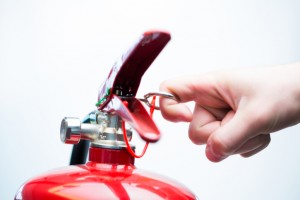When it comes to protecting your business and employees, very little is more important than fire protection. From sprinkler systems to marking your emergency exits, there are many ways to protect your business from fire. But one of the most important and effective fire protection devices is the humble fire extinguisher. Did you know there are different kinds of fires and different extinguishers for each fire? Let’s take a look at these fires and what type of extinguisher you need!
Fire Classifications
The first type of fire is classified as “A”. This type of fire is a result from ordinary combustibles such as wood and paper. The next type is “B,” which is the result of combustible liquids which include kerosene, gasoline, oil, and grease. Class “C” are fires of an electrical nature. These fires may be a result from a combustion of the circuit breakers, wires, outlets, and other electrical equipment and devices. “D” class fires are a result from combustible materials such as sodium, potassium, titanium, and magnesium. These fires most commonly occur in chemical laboratories but can occur in other environments as well. Class “K” fires consume vegetable oils and animal fats and are most likely to occur in the kitchen. Each of these fires are different and should be treated differently.
Types of Extinguishers
It is important to be careful when choosing an extinguisher for your business. Some fire extinguishers could be ineffective in certain situations or even cause hard to the operator if they are applied to the wrong type of fire. Extinguishers are classified by the type of chemical agents they contain and each chemical does something different.
- Dry Chemical: There are type types of dry chemical fire extinguishers. One is a “multi-purpose dry chemical” extinguisher that uses ammonium phosphate. This extinguisher is useful on A, B, and C class fires. They are commonly found in schools, homes, hospitals, and offices. These chemicals are corrosive and should be scrubbed from surfaces after extinguishing the fire. The other dry chemical extinguisher is known as a “regular dry chemical” extinguisher and is able to handle B and C class fires. They are commonly found in garages, kitchens, and laboratories. The sodium bicarbonate is easily cleaned up and is non-toxic.
- Water Extinguishers: These extinguishers cannot be used on class B, C, or D fires but can only be used on class A. Since these fire extinguishers use water instead of a chemical, making them environmentally friendly and relatively inexpensive.
- Carbon Dioxide: These extinguishers contain liquid CO2 that expel as a gas. CO2 extinguishes are used against B and C class fires. This chemical doesn’t leave a harmful residue and is environmentally friendly. They also pose very little danger to electronics and is effective in laboratories, computer rooms, and other places with sensitive equipment.
- Wet Chemical Fire Extinguishers: These extinguishers are the specifically designed for K class fires and commonly use potassium acetate. They are mostly used in commercial kitchens and restaurants and are especially useful around deep fryers. It comes out in a fine mist, which avoids causing a splash of grease onto surfaces and people. They are also useful in class A fires.
Whatever type of business you run, make sure you have the right extinguishers for your commercial space. For more information on our fire extinguishers or to have your extinguishers serviced, call Fireline today!
Keep your commercial kitchen safe, Fireline can help.
At Fireline, we offer an array of portable fire extinguishers, fire alarms, and sprinkler systems to keep commercial kitchens safe. Fireline offers the highest quality alarm systems to keep your business safe from fires and carbon monoxide poisoning. We also offer fire suppression systems as well to help keep commercial fires controlled should they break out. Our trained technicians will work with you to determine which air sampling smoke detection system is best for your business. We will also help install and maintain the system for your commercial building.
To get started with Fireline today, or for more information on sprinkler systems call us at 1-800-553-3405, or visit our contact page.
Be sure to “Like” and “Follow” the official Fireline page today on Google+, Facebook, Twitter, and LinkedIn.

